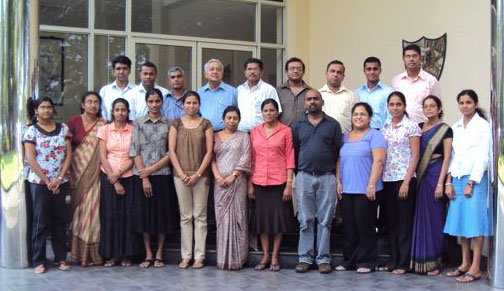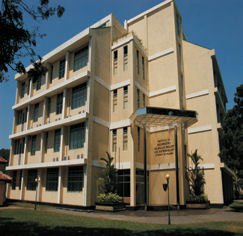Postal address: MAX-lab, Lund University, Box 118, SE-221 00 Lund, Sweden
Visiting address: Ole Römers väg 1
Web page: http://www.maxlab.lu.se/
MAX-lab (The Swedish synchrotron radiation facility) is a national laboratory operated jointly by the Swedish Research Council, and Lund University. The laboratory supports three distinct research areas: Accelerator physics, research based on the use of synchrotron radiation and nuclear physics using energetic electrons.
South Asia related research
Dr. Wimal Ubhayasekera is a researcher attached to MAX-Lab, and also the Institute of Medicinal Chemistry, Faculty of Pharmaceutical Sciences, University of Copenhagen, Denmark. He received his B.Sc. (Honors) in Zoology from University of Ruhuna, Matara, M.Sc. in Bioprocess Technology from the Asian Institute of Technology, Bangkok, Thailand and Ph.D. in Structural Biology/ Protein X-ray crystallography/ Molecular biology from the Swedish University of Agricultural Sciences, Uppsala, Sweden. His research activities are based on structural studies of proteins where he has determined the structures of several enzyme molecules, which are deposited in protein data bank (PDB). His expertise includes protein purification, crystallization, structure determination by x-ray crystallographic techniques and homology modeling.
 In September 2009, Dr. Ubhayasekera received a SASNET planning grant, for the organisation of an interdisciplinary workshop entitled ”Introduction to Protein Structures and Homology Modeling”. The collaboration partner for the organisation of the workshop on the Srilankan side was Dr. Jagath Weerasena.
In September 2009, Dr. Ubhayasekera received a SASNET planning grant, for the organisation of an interdisciplinary workshop entitled ”Introduction to Protein Structures and Homology Modeling”. The collaboration partner for the organisation of the workshop on the Srilankan side was Dr. Jagath Weerasena.
More information about the 2009 SASNET planning grants.
The workshop was successfully held at the Institute of Biochemistry, Molecular Biology and Biotechnology (IBMBB), University of Colombo, Sri Lanka, 4–8 January 2010 (see the group photo). More information about the workshop.
See a poster about the conference.
The outcome was positive. The conference gave a good start not only to research in
structural biology but also some collaborative projects. At least, the researchers became aware of the possibilities for molecular biology research. One srilankan research group launched a collaboration project with Dr. Ubhayasekara.
 IBMBB was constructed and equipped via a soft loan provided by the Swedish Government through Swedish International Development Cooperation Agency, Sida. IBMMB was ceremonially opened in April 2004 by the Swedish Ambassador in Sri Lanka and Prof. Ulf Pettersson, Vice-Rector, University of Uppsala, Sweden. Its Founder Director was Professor Eric H Karunanayake, Senior Professor of Biochemistry.
IBMBB was constructed and equipped via a soft loan provided by the Swedish Government through Swedish International Development Cooperation Agency, Sida. IBMMB was ceremonially opened in April 2004 by the Swedish Ambassador in Sri Lanka and Prof. Ulf Pettersson, Vice-Rector, University of Uppsala, Sweden. Its Founder Director was Professor Eric H Karunanayake, Senior Professor of Biochemistry.
The institute’s mandate is to provide postgraduate training and to carry out research on National relevance using tools of Molecular Life Sciences (DNA technology and related disciplines). Since its establishment, IBMBB has strived to provide internationally comparable high quality postgraduate education to local students at an affordable cost, and to undertake research in biomedical fields as well as on plants of economic importance. Current research areas include parasitic diseases such as filariasis and malaria aimed at finding novel drug /vaccine targets, genetic studies on vector mosquitoes, genes predisposing to breast cancer, studies aimed at identifying predictors of low birth weight and pregnancy complications, medicinal plants used against cancer, inflammatory diseases and malaria, genetic studies on rice, tea, rubber, mustard, finger millet etc aimed at identifying markers for disease resistance, drought/salt tolerance or for improving quality.